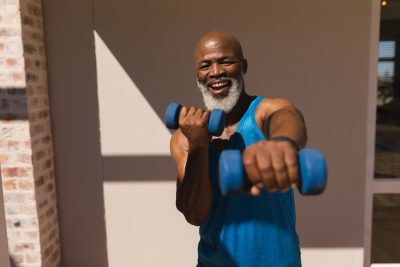You start a workout routine with genuine enthusiasm, but within weeks you’re finding excuses to skip sessions, feeling unusually tired, or mysteriously losing motivation. You blame laziness or lack of willpower, but what if your body is actually biologically programmed to resist exercise? New research reveals that some people have stronger internal barriers to physical activity that go far beyond simple motivation.
Exercise resistance isn’t about being lazy — it’s about how your individual physiology, genetics, and brain chemistry respond to the stress of physical activity. Understanding these biological factors can help you work with your body’s natural tendencies rather than fighting against them with sheer force of will.
Your genes influence exercise motivation
Some people are genetically predisposed to find exercise more rewarding and less effortful than others. Variations in dopamine receptor genes affect how much pleasure and satisfaction you get from physical activity, which directly impacts your motivation to continue exercising over time.
People with certain genetic variants need more intensity or novelty to achieve the same rewarding feelings from exercise that others get from moderate activity. This doesn’t mean you’re doomed to hate exercise, but it might explain why standard workout recommendations don’t feel sustainable or enjoyable for you.
Your genetic makeup also influences how quickly you see results from exercise, how efficiently you recover between sessions, and how your body responds to different types of physical activity. Some people see dramatic improvements in strength and endurance within weeks, while others need months to notice similar changes despite identical training programs.
Stress hormones create exercise avoidance
When you’re already dealing with chronic stress from work, relationships, or other life challenges, your body often interprets exercise as additional stress rather than stress relief. This can trigger cortisol responses that make you feel worse after workouts instead of better, creating a natural aversion to physical activity.
People with elevated baseline stress levels often experience exercise as overwhelming rather than energizing. Their nervous systems are already taxed, so adding the physical stress of exercise can push them into exhaustion rather than providing the mood and energy benefits that less-stressed individuals experience.
This stress-exercise interaction explains why some people feel fantastic after workouts while others feel depleted or anxious. Your body’s current stress load determines whether exercise will be perceived as beneficial stress that promotes adaptation or harmful stress that depletes your resources further.
Sleep and exercise create problematic cycles
Poor sleep quality significantly increases exercise resistance by affecting the brain regions responsible for motivation and decision-making. When you’re sleep-deprived, your prefrontal cortex – the area that helps you stick to long-term goals – functions poorly, making it much harder to choose exercise over more immediately gratifying activities.
Sleep deprivation also alters hunger hormones in ways that make you crave high-calorie foods and feel less satisfied by physical activity. This creates a cycle where poor sleep leads to skipped workouts, which can worsen sleep quality, leading to even more exercise avoidance.
Many people try to use exercise to fix their sleep problems, but this approach often backfires if the timing or intensity isn’t right for their individual physiology. Late-day exercise can worsen sleep for some people, while others need evening workouts to feel tired enough for quality rest.
Metabolic flexibility affects exercise tolerance
Your body’s ability to efficiently switch between burning carbohydrates and fats for fuel – called metabolic flexibility – strongly influences how you feel during and after exercise. People with poor metabolic flexibility often experience energy crashes, mood swings, or overwhelming fatigue during workouts.
If your metabolism is adapted to burning primarily sugar for fuel, exercise can trigger blood sugar instability that makes physical activity feel unpleasant or exhausting. This is especially common in people who eat frequent meals, consume a lot of processed foods, or have insulin resistance.
Building metabolic flexibility through strategic nutrition timing and gradually increasing exercise intensity can help reduce exercise resistance over time. This process requires patience, as metabolic adaptations can take weeks or months to occur.
Working with your resistance instead of against it
Start by identifying your specific barriers to exercise rather than assuming motivation is the only issue. Track your energy levels, stress levels, sleep quality, and mood before and after different types of physical activity to identify patterns that might explain your exercise resistance.
Choose activities that feel sustainable given your current stress load and recovery capacity. If traditional gym workouts feel overwhelming, walking, gentle yoga, or household activities might be more appropriate starting points until your stress tolerance improves.
Consider the timing of your exercise in relation to your natural energy rhythms, meal timing, and sleep schedule. Some people with exercise resistance do better with morning movement, while others need afternoon or evening activity to feel motivated and energized.
Focus on consistency over intensity initially. Brief, regular activity that doesn’t trigger your body’s stress response will build positive associations with movement and gradually improve your exercise tolerance over time.

















